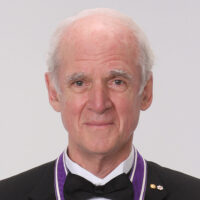
2008 Kyoto Prize Laureates
Thought and Ethics
/ Philosopher
1931 -
Professor Emeritus, McGill University
2008
11 /11 Tue
Place:Kyoto International Conference Center
A Secular Age and After —Secularization and Modernity—
2008
11 /12 Wed
13:00 - 17:00
Place:Kyoto International Conference Center
Dr. Taylor is an outstanding philosopher who advocates communitarianism and multiculturalism from the perspective of holistic individualism. He has pointed the future course for us through his own life, envisioning the future in which diverse, heterogeneous cultures peacefully coexist upon mutual recognition.
Dr. Charles Margrave Taylor is an outstanding philosopher who advocates “communitarianism” and “multiculturalism” from the perspective of “holistic individualism.” He has constructed and endeavored to put into practice a social philosophy that allows human beings with different historical, traditional, and cultural backgrounds to retain their multiple identities and to live in happiness with each other.
He has criticized the atomistic view of the self, the conception of the human being grounded in the human sciences of naturalistic tendency, and tried to establish a “philosophical anthropology” on a foundation of phenomenology, hermeneutics, and language-game theory. In his view, human beings are “self-interpreting animals.” He criticizes modern utilitarianism and argues that human beings are the “situated selves” that are embedded in the fabric of social relations. In other words, it is through webs of interlocution that human beings develop identities and acquire frameworks within which they determine for themselves what is good, what is valuable, what they should do, and what they are for or against.
Having made extensive studies of Hegel, Dr. Taylor delved back into the thought of Rousseau and Herder. He then adopted Gadamer’s notions “fusion of horizons” and “history of effects” to situate his own thought in a historical context and has built a convincing social theory. Drawing on the concept of “recognition,” which is a key to his philosophy, he contrasts the “dialogical self” with the “monological self” and offers “freedom in situation” in place of “absolute freedom.” Human beings can flourish only if their identities are recognized by others and, accordingly, he stresses the importance of bonds with community and sense of community as a necessary condition for the realization of liberalism emphasizing individual autonomy.
The concept of recognition is at the base of Dr. Taylor’s multiculturalism as well. Dr. Taylor has provided rational grounds for the dignity of human beings living a deep diversity and for their demands for recognition.
In his native Canada, Dr. Taylor is also involved in political activities. He has been seeking a way to overcome Eurocentrism and to reach for genuinely global values. He has invariably aspired to a society resting on mutual recognition, where each member strives by mutual efforts through dialogue for a better understanding. Dr. Taylor is a prominent thinker who has pointed the future course for us through his own life, envisioning the future in which diverse, heterogeneous cultures peacefully coexist upon mutual recognition.
For these reasons, the Inamori Foundation is pleased to present the 2008 Kyoto Prize in Arts and Philosophy to Dr. Charles Margrave Taylor.
Profile is at the time of the award.